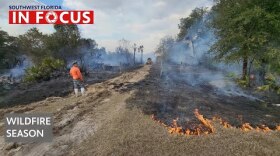Editor's note: State records, preliminary as of Jan. 7, 2023, raised the 2022 traffic death total in Lee County to at least 131. Of that number there were nine bicycle, 28 motorcycle, 32 pedestrian and 10 hit-and-run fatalities.
Lee County hit a dubious mark for 2022 — the second-highest number of fatalities on record from traffic crashes with at least 123 deaths as of Wednesday morning — and mirroring a national trend on such statistics.
Local and national traffic experts point to impatient and aggressive motorists, distracted drivers, and unbuckled vehicle occupants as a few of the likely causes for the increase in fatal crashes.
In Lee County, that unofficial record number of traffic deaths was reached after a crash, that saw a truck vault over the side of the Caloosahatchee Bridge Saturday, resulted in the driver's death two days later.
That fatal crash, and another one Wednesday morning in Lehigh Acres, pushed the number of deaths from crashes in Lee County to 123, making it the second-highest death toll in the county's history.
And the year is still a little more than a week from being over.
Video of Saturday's crash showed a truck driven by Thomas Gorman, 40, involved in a crash, swerve toward the side of the span and catapult over. Fort Myers Fire Department and other emergency personnel rescued Gorman, but Fort Myers police reported that he died on Monday.
Wednesday morning's fatal crash between a cement truck and a passenger vehicle happened in the area of Lee Boulevard and Leonard Boulevard. The Florida Highway Patrol said that the driver of passenger vehicle died at the scene.
Both crashes remain under investigation.

As of December 15, official state records logged by the Florida Highway Patrol showed 121 traffic fatalities for Lee County from 112 crashes involving deaths reported in the county.
The two recent deaths would push that unofficial number to 123, the second-highest death toll in Lee County ... ever. As in previous years the final, state-provided number on fatalities will likely rise in the first few weeks of 2023 as delayed, late and other traffic death reports filter in from law enforcement agencies.
Gulf Coast Live talks with two local experts on why Lee County is dangerous for driving
There were 150 deaths on Lee County roads in 2005, the highest death toll from traffic crashes in county history. The previous second highest number was 121 in 2006. There were 118 deaths in 2021 and 107 in 2020.
There were a number of years, this century and last, when Lee County's recorded road deaths eclipsed 100. Past fatality records showed 1989 and 1994 as previous record years with 103 deaths in both.
Lee County also leads all other Southwest Florida counties in 2022, some significantly. Fatalities thus far in 2022 range from eight in Hardee and Monroe counties, nine in Glades, 16 in Hendry, 19 in DeSoto, 52 in Sarasota, 39 in Collier, and 38 in Charlotte County.
The county's level of traffic deaths, per capita, is higher than in some larger Florida communities. Lee County, with a population of 787,000, has a fatality rate of one death for every 6,400 people. Miami-Dade County (2.6 million) has a rate of one for every 8,840, Orange County (1.4 million) is at one death for every 7,360 people and Hillsborough County (1.4 million) stands at one death for every 6,660 people.
Those who have to deal with the carnage on a regular basis have some suggestions for trying to keep road deaths to a minimum for the remainder of the year which coincides with celebrations sparked by Christmas gatherings and New Year's parties.
Lt. Greg Bueno, with the Florida Highway Patrol in Southwest Florida, said the biggest danger for Southwest Florida drivers is themselves.
"It's the lack of patience and aggressiveness that always leads to something bad," he said. "All of our families are using the same roads. We have to understand that our roadways are congested, our traffic volume is heavy, you know, and you need to adjust your commute to work or wherever it is you're traveling to accordingly, and you know, give yourself some extra time and not be under the mentality that you're going to make up that extra time on the road by being aggressive."
Bueno, a veteran state police officer who has been at the scene of innumerable fatal crashes over the years, said distractions are equally a danger.
"Putting your phone down. Stop multitasking behind the wheel," he said. "Your vehicle is heavy and you're traveling fast. Should you hit a bicyclist, a pedestrian, another vehicle, there's going to be potential injuries or property damage, and those are the very same things that we're trying to prevent. ... There's a lot going on, and it begs every single driver to pay 100 percent attention to each and every trip."
Lastly, Bueno said, drivers need to make sure they are well-rested, sober, and a good judge of speed if you're turning into oncoming traffic.
"All of these little things are big things, because these are the things that lead to the traffic crashes that we're responding to each and every day," Bueno said. "The property damage, injury, and unfortunately lately, especially the deaths on the roads, which are tragic."
Tara Gill, senior director of advocacy and state legislation at Advocates for Auto and Highway Safety, an alliance of consumer, medical, public health, law enforcement, safety groups and insurance companies and agents working to improve road safety in the U.S., said a similar set of circumstances plays out on a larger scale across the United States.
"Over the last couple of years, we've seen consistent increases in traffic fatalities across the U.S.," Gill said. "In 2021 they reached nearly 43,000 people killed on our roads, which was a 10.5 percent increase over 2020. And preliminary 2022 data finds that the fatalities continue to be to be very high. In fact, there was a .05 percent increase in the first six months."
Gill said that data from The National Highway Traffic Safety administration found that speeding, impaired driving, and fewer people buckling up have likely contributed to the increases and that distracted driving is an issue as well.
"The issue with distracted driving being we don't have great data on distracted driving. It's hard to collect that data," she said. "But we do know from analytics companies that it is prevalent on our roadways and you know if you're a driver, I think you you know, just have to look around to see other drivers nearby. You know, using their phones, whether it's they're in their hands, or whether they're tapping on a mounted device, with their phones. And distraction is a major issue, so you know, looking at those four big issues, those are, you know the leading ones, but that doesn't mean that that other things aren't contributing. Those are just the the big ones."
Additionally, Gill said her organization puts out a report called Road Map to Safety, now in its 20th edition.
"Putting out the 20th edition, we brought in our broader portfolio and mission that we work on to improve safety, and we incorporated it into the report," she said. "So you know, on a state level, we're saying to state legislatures, you know, take a look at your traffic safety laws, compared them to the optimal 16 laws that we're recommending, which are not, you know, we're not saying those are all the traffic safety laws that you should enact, but we're saying these are the basic critical ones that you need to have on the books. And if you, you may have passed the law, but it may not be the strongest version. So take a look at those laws that you have and fill in the gaps."
She said that on the local level, they're saying the US Department of Transportation has a tremendous amount of funding that's available to to improve the safety infrastructure of local roadways. They're also offering technical assistance to put together the plans needed to apply for that funding.
Lee County traffic fatalities since 2000
- 2022: 123 (As of 12/21)
- 2021: 118
- 2020: 107
- 2019: 98
- 2018: 94
- 2017: 113
- 2016: 105
- 2015: 95
- 2014: 81
- 2013: 92
- 2012: 64
- 2011: 75
- 2010: 65
- 2009: 80
- 2008: 77
- 2007: 106
- 2006: 121
- 2005: 150
- 2004: 108
- 2003: 121
- 2002: 71
- 2001: 113
- 2000: 105
Florida statistics
- 29,960 = Ten-year fatality total (2011-2021)
- 3,753 = 2021 fatalities
- $13.948 Billion = Annual cost due to motor vehicle crashes
Highway laws ADOPTED
- Primary Enforcement Front Seat Belt Law
- Open Container Law
- All-Driver Text Messaging Restriction
Highway laws NEEDED
- Primary Enforcement Rear Seat Belt Law
- All-Rider Motorcycle Helmet Law
- Rear Facing Through Age 2 or Older Law
- Booster Seat Law
- Rear Seat Through Age 12 Law
- Minimum Ages for Learner’s Permit and Licensing
- 70 Hours of Supervised Driving Provision
- Nighttime Driving Restriction Provision
- Passenger Restriction Provision
- All-Offender Ignition Interlocks
- GDL Cell Phone Restriction
- Permits Automated Enforcement by Law
- Automated Enforcement in Use
Source: Advocates for Auto and Highway Safety
WGCU is your trusted source for news and information in Southwest Florida. We are a nonprofit public service, and your support is more critical than ever. Keep public media strong and donate now. Thank you.





